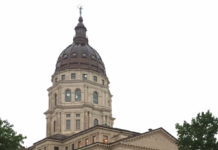Kansas Attorney General Derek Schmidt says the validity of Gov. Laura Kelly’s second disaster declaration is “doubtful,” finding that state law does not authorize new emergency powers stemming from the same event.
“We think the relevant statutory language is plain and does not provide for successive
declarations of a state of disaster emergency arising from the same continuing disaster,” Schmidt wrote in a 31-page opinion issued at 11:30 Wednesday night.
“We think the validity of the second disaster proclamation is doubtful, but we recognize that there are questions of fact that must be analyzed as well as opposing
arguments, and we cannot predict with certainty how a court might rule on these
matters,” he wrote.
The attorney general notes in his opinion that the law only refers to one disaster,
one proclamation, and one state of emergency.
He said the “plain language” of the law limits the governor to proclaiming a single
disaster emergency for any one disaster.
The law, he said, then gives that power to the State Finance Council to decide whether that state of disaster emergency is to be continued.
The attorney general’s opinion also says there are potentially state constitutional flaws in the emergency management law and urges prosecutors to use great caution in deciding whether to prosecute someone for violating an executive order.
The attorney general’s opinion comes hours before the Legislature is about to take up a bill that would limit the governor’s emergency powers.
Schmidt recommended that lawmakers pass legislation approving the state emergency disaster declaration that began on March 12 as way of minimizing legal challenges to executive orders or other emergency actions after May 1.
Republican lawmakers have becoming increasingly angry with the governor over her use of emergency powers during the coronavirus pandemic, saying she has treated businesses differently and unfairly during the pandemic.
Their frustration with the governor was rooted largely in her decision to limit the size of gatherings at religious activities, which set off two separate legal battles, including one that ended up blocking the Legislature from keeping check on her emergency powers.
State law allows the governor to issue an emergency declaration for 15 days, at which point it can be extended by 30 days by the State Finance Council or the Legislature.
The governor issued her first emergency declaration on March 12 and the Legislature agreed to allow it to last until May 1 with a series of checks on the chief executive’s emergency powers.
The governor issued a new emergency declaration on April 30, which lawmakers refused to extend for 30 days believing that she had already overstepped her authority in trying to deal with the pandemic.
Lawmakers agreed to a 12-day extension as they increasingly became frustrated with the governor, first over limits on church gatherings and later because they didn’t think she was moving fast enough to reopen the economy.
They have openly questioned whether Kelly had the power to issue a second emergency declaration for the same ongoing emergency and to what extent anyone can be prosecuted for violating the orders.
Later today, the Legislature will consider a bill that would ratify all of the executive orders the governor has signed since March 12 through May 26, when the governor’s existing emergency declaration expires.
The governor could not issue any new emergency declarations related to COVID-19 for the rest of the year unless she seeks the approval of the State Finance Council.
The bill would restrict the governor to shutting down businesses for 15 days during a state of emergency.
After 15 days, health officials in each county would decide whether businesses should remained closed with oversight from local county commissions.
The attorney general also raises constitutional questions about other parts of the state’s emergency powers law.
Schmidt says language in the law does not limit – either in time or subject matter – the continuation of emergency order so long as it’s ratified by a concurrent resolution of the Kansas Legislature.
“But under the Kansas Constitution, that is not how laws are made,” Schmidt wrote.
The procedure in the law to convert an emergency order into potentially permanent
law runs afoul of the state constitution, Schmidt wrote.
He also points to other language in the law as constitutionally questionable.
He said a provision of the law allowing the Legislature to pass a concurrent resolution revoking the governor’s orders “appears dangerously similar to a legislative veto
by concurrent resolution.”
Schmidt said the language in the law was was enacted in 1975, nine years before
the state Supreme Court ruled that a similar mechanism used by the Legislature to
to revoke regulations implemented by administrative agencies violated the
separation of powers of the Kansas Constitution.
Schmidt’s opinion urges prosecutors to use caution if they want to prosecute anyone for violating an executive order.
He said the validity and enforceability of individual emergency orders must be
determined on a case-by-case basis after a review of the content of the order.
The opinion sets out a framework of questions that prosecutors should analyze before undertaking a prosecution.
The opinion details five questions prosecutors should answer before deciding whether to bring a case against someone for violating an order.
“Because this statute is unusual, we recommend prosecutors and law enforcement
who may be considering criminal enforcement actions…proceed with caution and deliberation to ensure all applicable requirements for bringing and sustaining criminal charges are satisfied,” he wrote.
“We specifically recommend no criminal charges be filed until a prosecutor has exercised due diligence in addressing the questions presented in this opinion…and is satisfied that
the particular order at issue is lawful and may be lawfully applied to the defendant.”
.
















